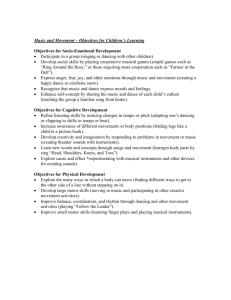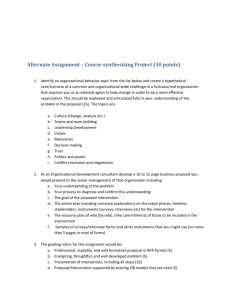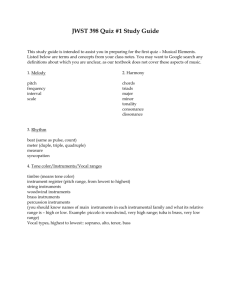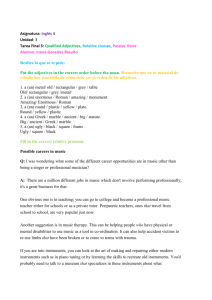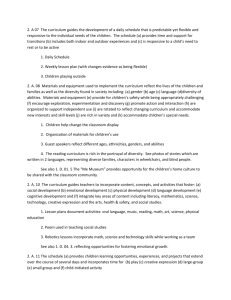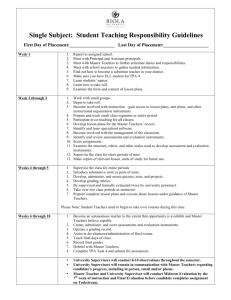ppt - openspacekassel.de
advertisement
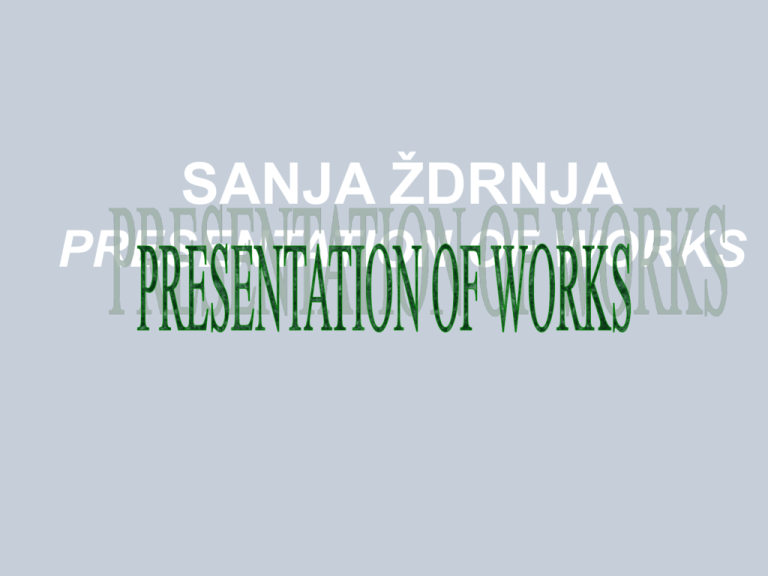
SANJA ŽDRNJA PRESENTATION OF WORKS Workshop “2D Mutant Zombies”-(Low-Key Low-Tech Identity Mapping Workshop) Workshop explores the issues of identity and its cultural instrumentalization.From the sixties to the recent new-media, cyber, gender and hybrid theories. The identity, as the specific theme of the Western art, has become the universal paradigm for the contextualization of art and turned into a cultural fetish. Workshop utilizes a low-key morphing method that is considered low-tech in the digital domain where it has been used for more than 15 years.Morphing is a digital animation technique for transformations between two images.It is realized through algorithms for warping and blending of pixels according to the given reference points or structural lines.The face is the key identity map and here is used for the purpose of pixel-level experimentation. The process of work was: first photograph pairs of portraits on the location, morph them and select one intermediary frame, print and exhibit as a life-size photograph.The result is a static bastard-image created within the animation process.Unlike the classical approach of Nancy Burson, the pioneer of morphing whose elegant portraits conceal the technique, here is different, we practiced freestyle morphing with equal use of digital limitations and tricks in order to make visually exciting and provocative works. The artist is a primarily in the role of manipulator, paradoxically renders hybrid portraits with clear qualities of “personality” and “character”, open for identification and any other relation which open the space for the game and thinking. 1. morf 2. morf final morf foto-instalation „On the edge „ , 2006 Photomontage “ On the edge” I made this print for my final exhibition at the faculty of fine arts ( in Belgrade ).I spent five years of my life there.I worked there and listened the stories about earlier generations and who become the famous art star, etc.I know the building from different sides, outdoor, indoor, simpliest, every angle of every room.It was my so called secon home; that is the reason I choose precisely that building.The arhitecture without decoration was for me inspiration and I put the line ( with human body ), I called it “Mejbrige’s line”, on the edge of the roof.First, for the tests I choose Mejbrige photo when he shot the man who stand on the hands.But his photos from book is not so clear and good for manipulation and so, I find model to make photos.Here I duplicate and got the line:of strong, young men, stand upside down on the hands, larger than average size, human size.This work have references to the work of for example Leni Rifenshtal or Rodschenko, it is look like it belong to the past time, so it is the same with my situation, for me the memories belong to the past.Also, the line look like on young new generations, in the same time, they are young, they could compete among themselves.Who is the original and who is the copy ( in big print we do not know but in postcard ) I discover. I use postcards only for good memory and also for my own art marketing. postcard “ on the edge “ Seria of photos „ Miror „ I made in 2005. I made in space of contemporary museum in Salzburg. I find silver, aluminium suface and I used my reflection in it. I find oneself like funny figure with new form of the body and also with halo above my head. Changes of my apperance and see oneself in different view. It’s almost like game with funny mirror and my experience in that position. Overlaped photos ( two photos: one is autoportrait and the other is laying figure in the salt ); the title is „ Memento mori „ ( hand-made black and white photograph; size: 2x1,7m) ; the thinking about material : salt; in the sense of christianity ( in Bible’s sentence : „ You are the salt for the ground „ ) and recollection of our death and the sense of our existence in this life and the nature of our souls; in the other hand, reference with the whole cause ( with the chemistry ) in black and white laboratory. “Patterns for my white shirts” Digital photos of autoportraits; first, I multiplied and made them in very small size, so, nobody can recognize the face and I used it to make print for ( the way I called this work ) my white shirt. The pattern is the square. I photograph myself with the cosmetic mask on my face, like, everyday ritual in women’s life. And, the other part of the concept is that I choose, for the object, shirt- for me that is,definitely, male symbol ( and shirts for female are the second version of the first one).Put that white canvas ( with the print on it ) on my body, I do, again, one more ritual of cleaning, this time, cleaning from that symbolical meaning. PHOTO-INSTALATION:”BAD/WHITE “,SOLO-EXIBITION, GALLERY “ALKATRAZ”, SALZBURG, SUMMER ACADEMY, 2005. PHOTOGRAPHY CLASS OF KATHARINA SIEVERDING I created photo-instalation for the very small room or gallery( in the old salt factory in Salzburg ).At first I collect lot of trash photos from my dark room where my friends and I develop the black and white photos.Very often people do something wrong with the light and exposure and get bad results.Thus I found that these pictures have some sence for me. They are new works even they are bad photos in a view of professional photographer.I collect pieces black and white, black or almost really white photos.Some of wet photos I put on the sun light and I get gold or bronze colour on photo-papier.I choose to use my intuition and hang them on the wall and make big photo-wallpapier.I put in my work all experiences and events and hopes, etc from the other people, my friends.That emocional attitude was important for me and have impact on me.I use chair instead of the ladder, scissors, tape and on the end of the action I decide to leave everything like it is, on the flour.I add only light, slid-projector light and put the projector under the chair.So, when you want to come inside, first you are blinded with the light and you don’t see anything.When you are approach you see photo-wallpapier and details, some pictures and the parts of the photos.Whole new big photo on the wall look like on enformel painthing with lot of layers. The title speaks us how the light could be in a position of creator. Corridor final wall The title of this work, video installation is Corridor Final wall.First I created the space, six meters corridor and present that video in the space.I choose hidden space in building, so you can go and in one moment you will find or discover the space.The corridor can be see only from the inner side.I put projection on the final wall of that corridor.That is the man of hidden identity cos it can be female and male and also model whowalk and do not show the front side of appearance.We only can see him or her from the back.Story about lonliness of existence.This figure exists and live here ( in that space ), like for example, very rare animal sort-human fish, live on the space of Slovenia, in Postoina cave.I show the video all the time in gallery space, put in loop-the video is about 30 min.So, it is like 2D sculpture.She or he walks and does it very sophisticated.She walks, sits, makes some different positions with the body, but very slowly.The sound of breathing, first one when she/he stands and when she/he walks, then we can hear sound of few breathing.First we see one figure then four. GENTLE SPINE, 2006. GENTLE SPINE “ GENTLE SPINE “ “ GENTLE SPINE „ , 2006. ( exhibit on the solo-exhibition :“Playing instruments=objects in the empty room “ ) „ TAKE A BASS BREATH „ , 2007. ( exhibit on the solo-exhibition :“Playing instruments=objects in the empty room “ ) „ PLAYING PIANO IN THE EMPTY ROOM „ , 2007. ( exhibit on the solo-exhibition :“Playing instruments=objects in the empty room “ ) „ GIFT I „ , 2007. ( exhibit on the solo-exhibition :“Playing instruments=objects in the empty ( exhibit on the solo-exhibition :“Playing instruments=objects in the empty room “ ) „ GIFT II „ , 2007. “Tear objects” Series of sculptures, that I called them “Tear objects” consist of seven shapes in polish aluminium.I got it from my face-I got prints from my face choose surfaces which fluid form follow the form of my face.These elipsas forms are polish with the purpose to get reflection quality and stand exibit in the space.But, I back them on the place of birth in the line of autoportraitsphotographs with the objects.On this way, the sculpture becomes anecessary, organic decoration to the natural appearance.To emphasize metal quality of everyday object on these photographs, my portrait get increase shining.Also, the form of the hair correspond to these aluminium shapes.Through this work, I research connection between presentation and performance of my own identity and its appearance . ( exhibit on the solo-exhibition :“Playing instruments=objects in the empty room “ ) 00: empty room, body, three male and two female instruments 01:In the book Body art- performing the subject Amelia Jones states that body art in particular confirms the premises of the phenomenology and psychoanalysis, that the subjects relations to the others adds to its meaning, and that the locus of identity is always elsewhere. The Empty room is an important step with which Sanja establishes the logic of building intimate atmosphere and the condition to articulate the embodied intersubjectivity, characteristic of the performance art (Hannah Wilke). This intervention of the authoress opened the possibility to represent personal, erotic fantasy of another body, outside of the wider social context. Just like Wilke in the seventies and the eighties, Sanja treats her body as a sculptural form. However, even though they are equally sensual, her works cannot be considered destructive. She tries to reexamine the questions of sexuality, femininity or feminism, only if we agree that she offers quite a different focus. Her performance has no direct ambition to emancipate, but it suggests the state of intimate harmony. Sanja’s body, entwined in an erotic act, does not figure just as its own image; it’s her entire being faced with an attempt of reproduction, desire or appropriation of the other as an object or a subject of pleasure. Isolating herself in an empty room, the authoress is trying to take a position opposed to the lack in the Other, of the Symbolic order, desire and jouissance of the Other, and uses fantasy as a relatively stable means of defense. A similar erotic relation which gives figurativeness to the body can be seen in Marcel Duchamp, whose alter ego Rose C’est la vie has a function of denying the lack. The Other is here embodied in the instruments of various sizes and it represents two principles: male and female. Sanja does not only offer her own body as an object, she also points out the resonance created in the encounter with the male (Gentle Spine, Take a Bass Breath, Gift), and left out in the relation with the female instruments (Playing Piano in the Empty Room, Tear Objects). Fantasy could be explained with the mirror phase which, in an essay displayed for the first time at the Psychoanalysts’ Congress in Zurich in 1949, Lakan explained as identification or transformation which constructs the ego, taking the images of others (imago) If we interpret the more recent works of Sanja Ždrnja as an imaginary identification of the mirror phase, they enable us to see the Ego in its primordial form, in the time before its function as the subject in language. As the male instruments, such as the one following the line of the authoresses spine (Gentle Spine), or a smaller instrument shaped after her fingers, in the place of subjects in genesis, there are no visible signs of separation between them. The male instruments are the projection of the Ego inscribed into the imaginary register, and in unison with Sanja’s body, they realize the harmony of imaginary identification. Their relation can also be interpreted like a pre-oedipal stadium, as a natural state in which the need for closeness and compassion is realized. They have the function of balancing the authoresses libido and they represent the identification point of the foundation of her subject, with the aim to make it coherent and closer to Ideal Ego. While the male instruments are in unison with the authoresses body and they make the resonance possible, the female instruments are breath stopping. The imprint of the authoresses body in Playing Piano in the Empty Room¸or the imprints of her face in Tear Objects, point out the insufficiency of female body and the indispensable presence of the male subject whose effect it would be. It would seem that Ždrnja knows that the subject, as seen by Lakan, does not exist apart from the constant flow of meaning, but only as a single event in an unending flux, and that its particularities do not originate from the strengths, attitudes and dispositions the individual possesses in various situations, but from the marking process whose part they make. Ždrnja uses photography, as a medium which enables her to freeze the relation of her body and the instruments, and to defend herself from the flow of markers, which represent the lack. This way she hints that in the intimate atmosphere of an empty room her non-fragmented self is still possible. Maja Ćirić, curator ( solo-exhibition :“Playing instruments=objects in the empty room “ )


